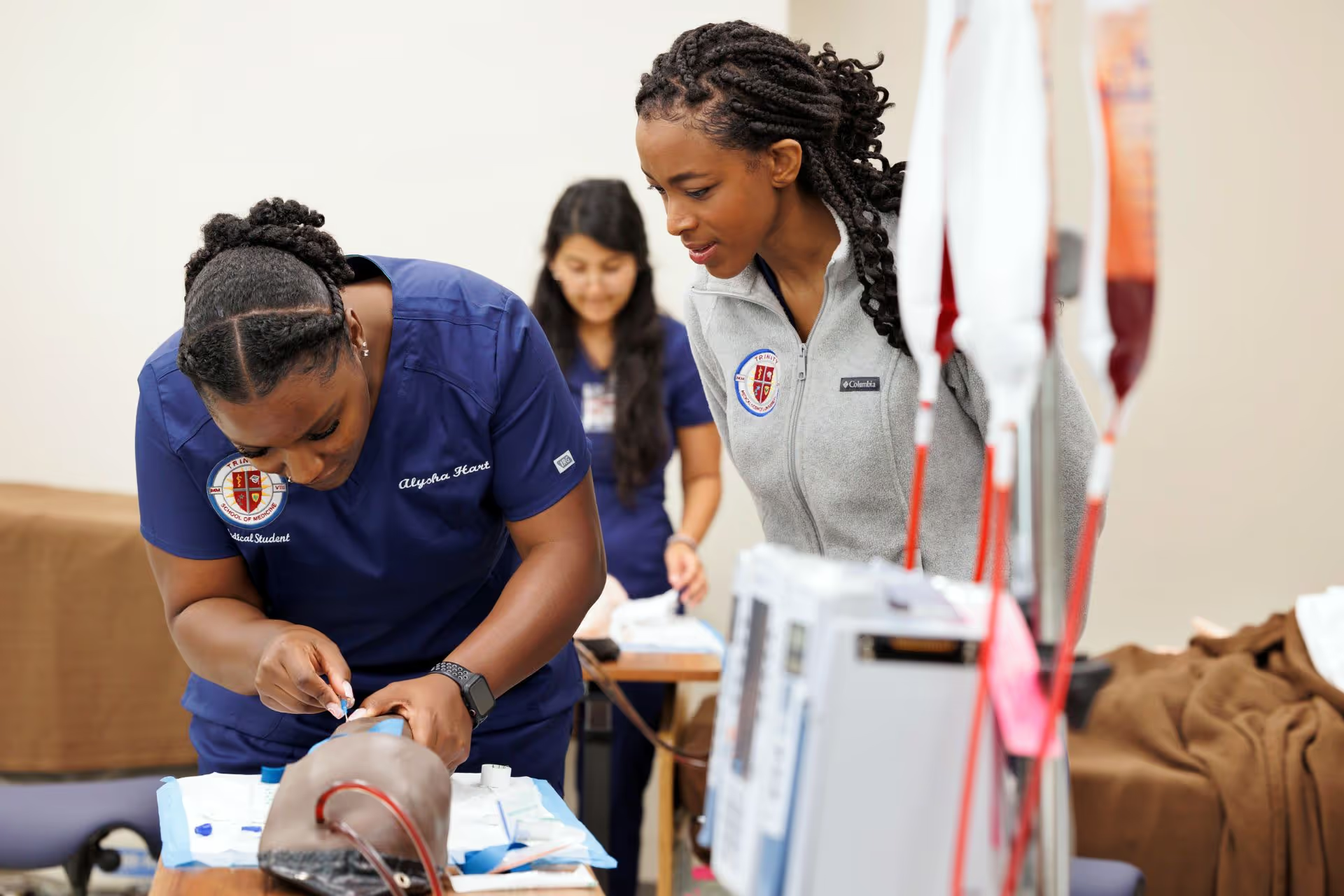MD PROGRAM ACADEMICS
Personalized Education

Key Academic Highlights

Academic Calendar
Trinity operates on a three-term schedule per calendar year with classes beginning every January, May, and September. Each term is approximately 15 weeks.

Curriculum
Experience the impact of an integrative spiral curriculum, an evidence-based learning approach designed to reinforce knowledge through repetition and incremental complexity.

Term 5 - Step 1 Prep
A fully immersive study experience has been carefully tailored to meet the unique needs of students before they start clinical rotations.

Clinical Sciences
Complete all your rotations in one location in Warner Robins, GA; Baltimore, MD; McAllen, Texas; or the West Coast in California. No moving from city to city, no gaps between rotations.




- Prep for USMLE Step 1


- 48 weeks


- 27 weeks
.avif)
Academic Competency
Trinity’s faculty is responsible for meeting the following competency-based objectives through our courses and clerkships.
Research Opportunities
The quality of education at Trinity School of Medicine is demonstrated by the research and scholarly accomplishments of our students and faculty. Trinity students have numerous opportunities to get involved with research by partnering with professors on projects currently underway or even designing their own projects under the mentorship of faculty. Students may also have the opportunity to write and publish case reports during their early clinical exposure at Milton Cato Hospital in SVG. Once in clerkships, students have opportunities to partner with preceptors on research projects and case reports or complete a research elective rotation. In addition, clinical students with an interest in research are invited to join the Trinity Journal Club, where students can present case studies, conference posters, or simply talk about research ideas.

Find Your Success at Trinity
Discover the Trinity experience through students and alumni! Learn more about the small class sizes, early clinical experience, rotations in one location, and more!
Supportive Community
Where unparalleled support meets student success.
Clinical Rotations
Rotations are scheduled for you in one location.
Small Class Sizes
Feel valued and seen from the very beginning.
MD Program FAQs
A Doctor of Medicine is a professional degree awarded to individuals who have completed the necessary education and training to practice medicine. MD holders are trained to diagnose, treat, and prevent illnesses, as well as provide medical care to individuals and communities.
With a Doctor of Medicine degree, individuals can pursue a variety of medical careers, including becoming physicians, surgeons, researchers, educators, or healthcare administrators. The MD degree opens doors to opportunities in various medical specialties and settings, ranging from hospitals and clinics to research institutions and public health organizations.
In a 4-year doctoral program, students have a condensed curriculum with a focus on essential medical knowledge and clinical skills. This approach allows students to enter the medical field sooner and begin their residency training earlier.
Prior to matriculation, Trinity’s MD program requires:
- Verifiable score(s) on the MCAT exam. Medical College Admissions Test (MCAT) scores are required for all U.S. citizens, nationals, and eligible permanent resident applicants and encouraged for everyone else.
- One year each of:
- General Biology
- General Chemistry
- English Composition
- And one semester each of:
- General Physics
- Mathematics (Trigonometry, Analytic Geometry, Precalculus, or Statistics is highly recommended)
- Behavioral Science (Intro to Sociology or Psychology)
- Two individual letters of recommendation or one committee letter from your pre-health advising office.
Some advantages include a shorter time to completion, reduced tuition costs, and earlier entry into the workforce. Additionally, students may have the opportunity to specialize or enter their desired field sooner.
Academic performance is obviously an important factor. That said, Trinity places a premium on student experience, character, leadership, communication skills, drive, and passion, recognizing that sometimes grades don’t paint the entire picture. While GPA plays a major part in student selection criteria, we consider trajectory and consistency of grades and examine an applicant’s BCPM (Biology, Chemistry, Physics, and Math) GPA independently of other course work. We are also open to explanations of context and a clear narrative of personal growth.
The reality is that the best doctors aren’t always the best university freshmen. We understand. We think of Trinity as an opportunity to show yourself, and the world, just how great you can be in a focused, supportive environment.
Our Doctor of Medicine program is suitable for individuals who aspire to become compassionate and skilled physicians. Prospective students with a strong academic background, a passion for healthcare, and a commitment to making a positive impact on patient well-being are encouraged to consider our program.
Medical College Admissions Test (MCAT) scores are required for all U.S. citizens, nationals, and eligible permanent resident applicants and encouraged for everyone else. The admissions committee takes a holistic approach, considering various aspects such as academic achievements, personal experiences, letters of recommendation, and medical school interviews to assess an applicant’s suitability for the program.
Absolutely! Trinity School of Medicine welcomes applications from international students, including Canadian medical students. Our MD program values diversity, and we encourage qualified candidates from around the world to apply. International students bring unique perspectives to the learning environment, enriching the overall educational experience.
Yes, graduates of our MD program are eligible to pursue licensure and practice medicine in the United States. Trinity School of Medicine is a CAAM-HP accredited Caribbean med school, ensuring that our graduates meet the necessary standards for licensure. The school provides support and guidance to help graduates navigate the U.S. and Canadian licensing process.
To apply to our MD program, please navigate to the admissions page. Here, you will find detailed information about the application process, including medical school admission requirements, deadlines, and instructions for submission. If you have specific inquiries or need assistance, feel free to contact our Admissions Office directly. We invite you to apply to Trinity today!




